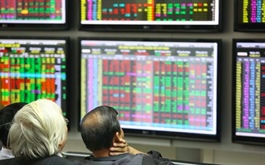Brokers see downturn as chance to consolidate before growth returns
Brokers see downturn as chance to consolidate before growth returns
Director of Brokerage at southern-based Dai Viet Securities Vu Hong Nhung's current assessment of the stock market is that it is quite sluggish with low liquidity and an absence of vibrant capital flows.
"This may be a good period to accumulate, as the market is re-evaluating both international and domestic developments, particularly the ongoing net selling by foreign investors," said Nhung.
January saw foreign investors pull approximately $260 million from the HSX, representing the fourth consecutive month of net-selling. In the first half of February, the net-sell off came to around $240 million, all but ensuring a fifth consecutive month for the streak.
"Therefore, the strategy that investors should focus on now is defensive in terms of capital, portfolio, and trading methods," explained Nhung.

Photo: baodautu.vn |
Nhung suggests investors should reassess the funds they have allocated to securities, prioritise long-term capital, and limit the use of leverage to avoid risks in the case of a market correction. Using short-term capital may create significant pressure if the market does not perform as expected.
"Meanwhile, for investment portfolios, this is the time to review, select, and reassess, focusing on companies with strong fundamentals, long-term growth potential, and competitive advantages within their industries.
Additionally, investors may consider allocating a portion of their capital into other financial products, such as fund certificates from reputable institutions, to diversify their portfolios to optimise investment efficiency," said Nhung.
According to Nhung, investors should prioritise buying preferred stocks at lower price bases during market corrections and maintain trading discipline. This approach can help avoid discouragement amid prolonged market stagnation and prevent missing out on attractive future opportunities.
"A sluggish market may discourage investors, but it is also an opportunity to consolidate positions before the market enters a new growth cycle," Nhung added.
Analysts at Hanoi-based KB Securities Vietnam (KBSV) suggest that while preparing strategies to safeguard profits during this accumulation phase, investors should also note positive factors that could impact the market in February.
KBSV analysts forecast that given the positive profit trends of listed companies over the past year, the overall market Earnings Per Share is improving, making the VN-Index valuation relatively attractive.
The positive results in the most recent fourth-quarter earnings reports are reflected in market movements. Encouraging profit reports, especially from the technology and banking sectors, further strengthen investor sentiment and create expectations for increased capital inflows.
Additionally, stable or slightly declining exchange rates help reduce risks for import businesses and companies with large foreign currency debt while facilitating foreign investment inflows. Exchange rate stability also helps control inflation, creating a safer investment environment, which is a positive signal for the stock market.
A key market focus in the near future will be Vietnam’s stock market upgrade process by FTSE Russell, a global index leader in stock market classification.
Investors are eagerly awaiting updates, with Vietnam potentially being placed on the watch-list for an upgrade from frontier to emerging market status in September and for an official upgrade in early 2026.
KBSV asserts that this development is expected to maintain optimistic market sentiment and unlock numerous investment opportunities.
The VN-Index closed at 1,265 points at the end of January, with the market showing less optimism in the first half of the month but experiencing recovery in the latter half, ultimately ending the month at a level nearly unchanged from the end of 2024.
The average daily matched liquidity on the HSX in January remained low, approximating $380 million per session, 37 per cent lower than the same period last year and 42 per cent lower than the 2024 average.




























